Britain’s Burnout Crisis: The UK’s Most Overworked Jobs
Burnout is no longer just a buzzword; it’s a growing crisis in Britain’s workforce. While official stats suggest working hours are falling, our findings reveal a different reality: millions are clocking in unpaid hours every week, fuelling a hidden epidemic of overwork.


Our customers have been hired by: *Foot Note
The Hidden Overwork Epidemic
While official figures suggest the average working week in the UK has slightly decreased over the years 1 (from 38.1 to 36.4 hours), this statistic masks a troubling reality for millions. A hidden epidemic of unpaid overtime is pushing many British workers to their limits, fuelling a national burnout crisis that affects public health, the economy, and essential services across the country.
This isn’t just about a few late nights at the office. It’s a systemic issue where a significant portion of the workforce is performing hours of extra work for free every week. This investigation delves into the data to reveal which professions are the most overworked, what’s driving this culture of burnout, and the profound cost to individuals and the country as a whole.
The UK’s Most Overworked Professions
Analysis of the UK labour market consistently reveals a core group of professions bearing the brunt of the overwork crisis. The key factor is not just long hours, but the staggering amount of unpaid overtime that has become the expectation in these roles.
According to a detailed analysis by the Trades Union Congress (TUC), 3.8 million people in the UK performed unpaid overtime, working an average of 7.2 extra hours per week.2 This amounts to a staggering £26 billion worth of free labour for the UK economy. The problem is particularly severe in the public sector, where 1 in 6 workers performs unpaid overtime, compared to 1 in 9 in the private sector.
The following professions stand out as the most affected by this crisis.
Top 5 Occupations for Unpaid Overtime (2023)
| Occupation | Proportion Doing Unpaid Overtime | Average Annual Loss per Worker |
| Chief Executives and Senior Officials | 38% | £28,177 |
| Directors in Logistics, Warehousing and Transport | 33% | £25,446 |
| Other Educational Professionals | 25% | £16,801 |
| Functional Managers and Directors | 29% | £16,705 |
| Teaching Professionals | 40% | £15,047 |
Source: TUC Analysis of Labour Force Survey, 2023 2
From Classrooms to Boardrooms: The Faces Behind the UK’s Overwork Epidemic
Burnout is affecting workers across many industries, not just one or two. In the next section, we look at three very different roles: teachers, NHS staff and senior managers, to show how unpaid overtime is taking its toll. Each group faces unique challenges, but the impact of overwork is equally serious.
Case Study 1: The Teaching Profession
Teachers are at the absolute epicentre of the UK’s overwork crisis. An astonishing 40% of teaching professionals work unpaid overtime, the highest proportion of any major occupational group. They perform an average of 11 hours of unpaid overtime every single week, costing them an average of £15,047 a year in lost wages.
The problem isn’t the teaching itself, but the mountain of other tasks they are expected to complete.
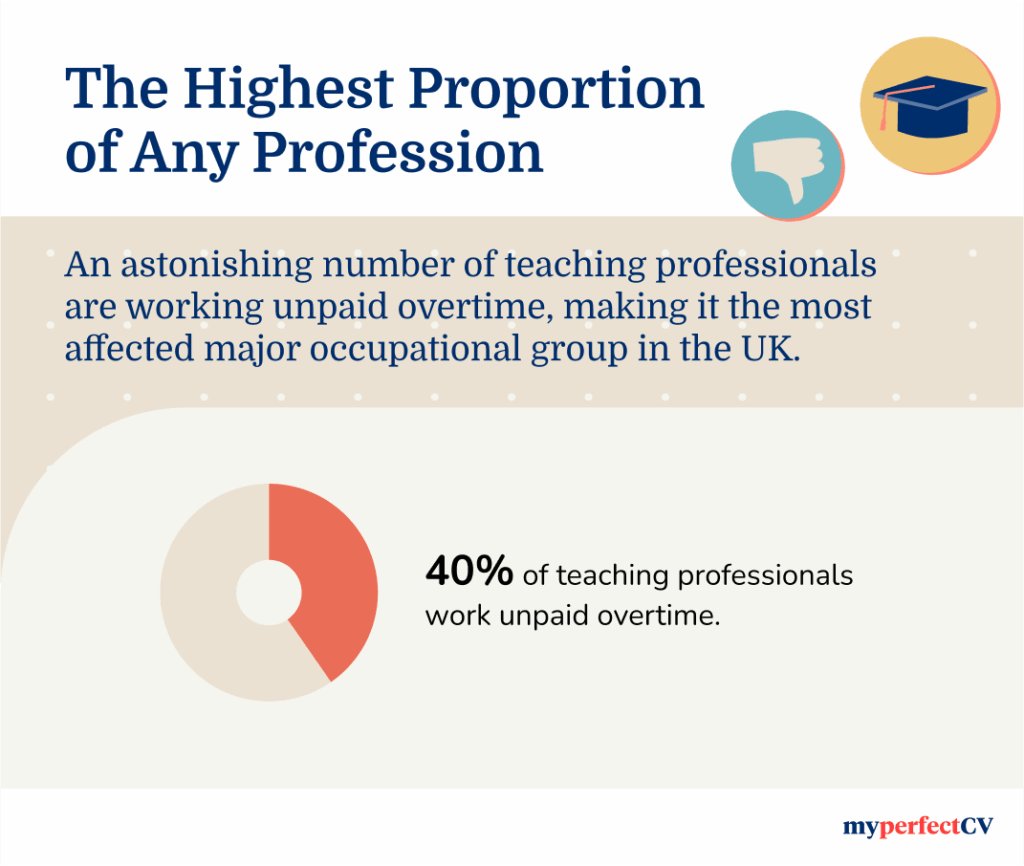
- The drivers of workload: Teachers consistently point to an overwhelming administrative burden, including endless data entry, paperwork, and emails. The pressure of the Ofsted inspection system creates a culture of “evidence gathering” that adds to the workload and stress.3 This is made worse by chronic staff shortages and funding cuts, which force teachers to take on even more responsibility.
- The human cost: This unmanageable workload is the primary reason for the profession’s severe recruitment and retention crisis. Around 30% of new teachers quit within their first five years, citing burnout and a poor work-life balance as key reasons.4 This creates a vicious cycle: as teachers leave, the workload on those remaining increases, leading to more burnout and more departures.
Case Study 2: NHS Frontline Staff
The National Health Service (NHS) is another institution where overwork has reached critical levels, driven by chronic staff shortages and immense pressure. While specific data for doctors and nurses is grouped into broader health categories, the evidence of burnout is overwhelming.
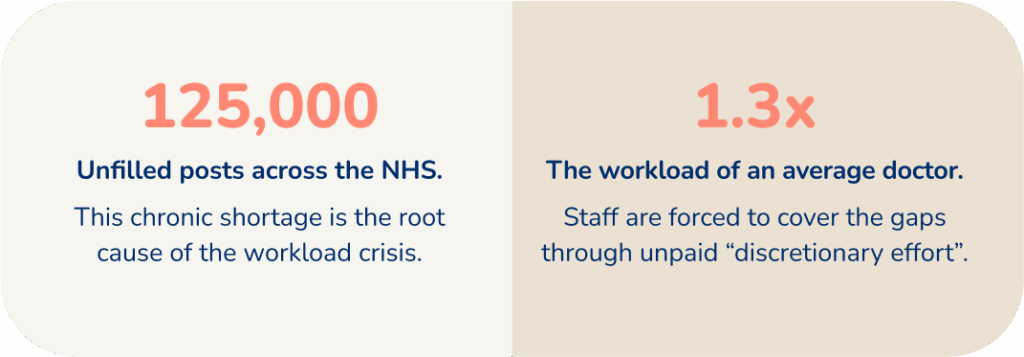
- The drivers of workload: The fundamental problem is a mismatch between patient demand and staff numbers. The NHS has over 125,000 unfilled posts, meaning the average doctor is doing the work of 1.3 people, often through unpaid “discretionary effort”. Like teachers, clinicians are also bogged down by administrative tasks and IT systems that take time away from patients. The emotional toll of caring for the sick, combined with the “moral injury” of being unable to provide the best care due to systemic constraints, is a profound source of stress.
- The human cost: Burnout is a primary reason staff leave the NHS.5 The number of employees leaving for a better work-life balance has more than tripled since 2011. This crisis is particularly affecting the next generation, with stress levels rising fastest among young nurses. In 2023, 52% of nurses aged 21-30 reported being made unwell by work-related stress, a sharp increase from 38% a decade earlier.
Case Study 3: Senior Managers and Directors
It’s not just the public sector feeling the strain. Chief executives and other senior managers consistently rank among the most overworked professionals in the UK.
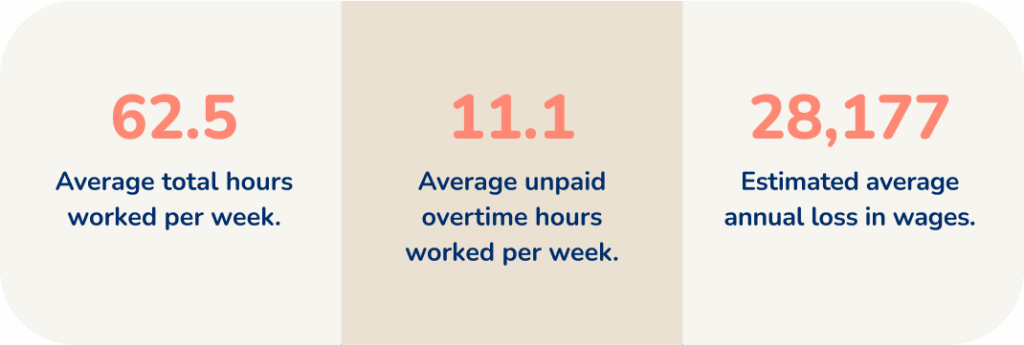
- The scale of the burden: Chief executives work an average of 11.1 unpaid hours per week, losing out on an estimated £28,177 a year. Their total working week averages a staggering 62.5 hours.
- A different kind of pressure: While the hours are long, the nature of this overwork is different from the public sector. It is often driven by a demanding corporate culture and high levels of responsibility, but it is also typically accompanied by significant financial rewards and high status. This doesn’t make the health risks of overwork any less severe, but it distinguishes the experience from that of a teacher or nurse whose extra hours are often driven by a lack of resources.
The Drivers of Britain’s Burnout Epidemic
The crisis of overwork and burnout in the UK is significantly fueled by a pervasive “always-on” culture. Modern technology, particularly smartphones and laptops, has effectively erased the traditional boundaries between our professional and personal lives. This creates a silent but powerful expectation for employees to be constantly available, leaving them digitally tethered to the office long after the workday should have ended.
In addition, with widespread job insecurity and wages failing to keep pace with the rising cost of living, many employees feel compelled to work unpaid hours just to prove their value and protect their roles. This problem is often intensified by companies adopting “lean” staffing models, which systematically increase individual workloads. Reinforcing this, a report from Mental Health UK identified increased workload and the pressure to work overtime as top stressors leading directly to burnout.
The Wider Impacts of an Overworked Nation
The consequences of overwork extend far beyond the individuals and professions directly affected, creating significant challenges for public health, the economy, and social equity. The cumulative effect of excessive workloads, high stress, and poor work-life balance has a measurable impact on the nation as a whole.
A Public Health Crisis: The True Cost of Stress
The scale of work-related stress in the UK has become a public health emergency. According to the Health and Safety Executive (HSE)6, the national workplace regulator:
- In 2022/23, 875,000 workers suffered from work-related stress, depression, or anxiety.
- This accounted for 49% of all work-related ill health, making it the single biggest occupational health problem in Great Britain.
- The crisis resulted in 17.1 million lost working days in a single year.
- The total annual economic cost of work-related injury and ill health stood at a staggering £21.6 billion in 2022/23.
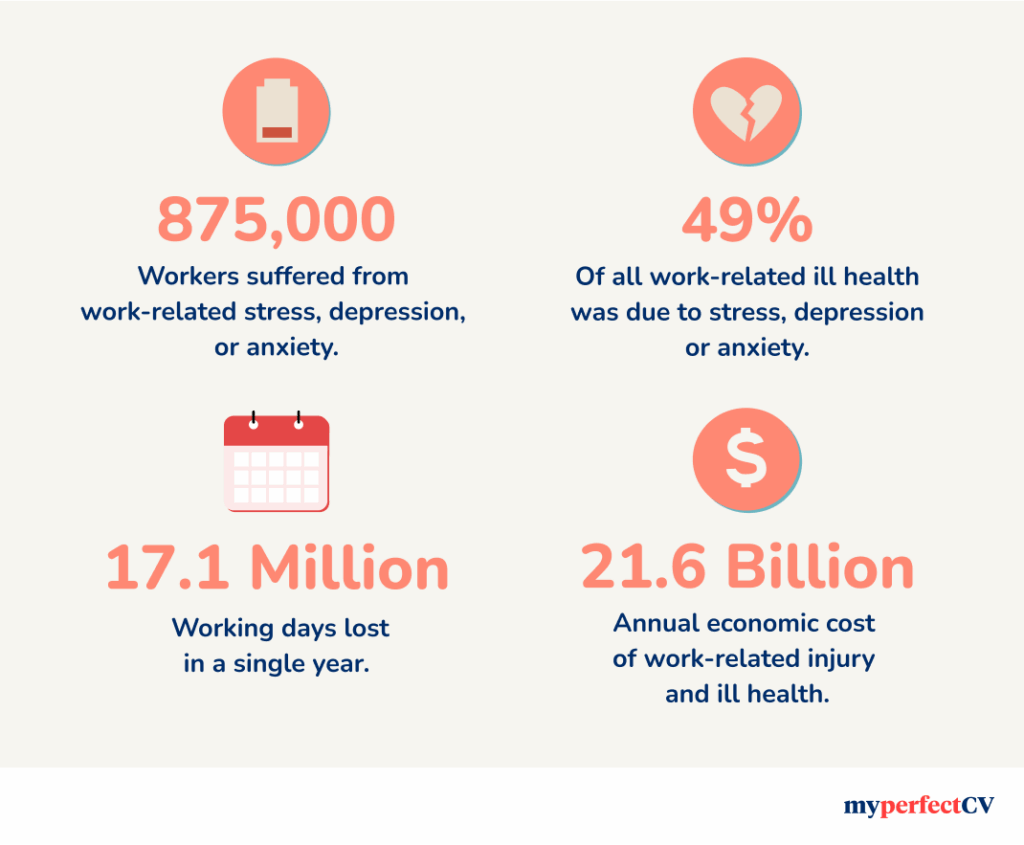
Crucially, the industries with the highest rates of stress are health and social work, public administration, and education, confirming that burnout on the front lines of public services is a primary driver of this national health crisis.
The Job Quality Deficit: When a Pay Rise Isn’t Enough
Overwork is a key symptom of a broader decline in job quality for many. Research shows that for many workers, especially the lowest-paid, their jobs have become more stressful and intense, even if their wages have gone up.
A fascinating study by the Resolution Foundation7 found that thirty years ago, low-paid workers in the UK were actually more satisfied with their jobs than higher earners. Today, that satisfaction premium has completely vanished. Despite the success of the National Minimum Wage in boosting pay, the negative effects of rising work intensity, stress, and a lack of control have wiped out the positive impact of higher wages on job satisfaction for this group. This shows that simply paying people more is not enough to make a job “good”.
The Future of Work: Finding a Better Balance
In response to the growing crisis of overwork and burnout, new working models are being tested, and a new legislative agenda is being debated. These developments point towards a potential transformation in how work is structured and regulated in the UK, moving away from a culture of presenteeism towards one that prioritises efficiency and wellbeing.
The Hybrid Work Paradox
The shift to remote and hybrid working has been a double-edged sword. For many, it has improved work-life balance. One survey found 75% of hybrid workers reported a positive impact.8 However, it has also blurred the lines between work and home, leading to an “always-on” culture. Research shows that remote and hybrid workers are more likely to do unpaid overtime, as they find it harder to switch off from their jobs psychologically.
A Possible Solution? The Four-Day Week
A more structured solution gaining significant traction is the four-day working week. The results from major UK trials have been overwhelmingly positive.9 The model is simple: 100% of the pay for 80% of the hours, in exchange for maintaining 100% productivity.
The world’s largest trial in 2022 saw 92% of participating companies decide to continue with the four-day work week. The benefits were clear:
- For employees: 71% of employees reported lower levels of burnout, and nearly half felt “most satisfied with life”.
- For businesses: Companies reported that productivity was maintained or even increased, and they saw fewer sick days and better staff retention.
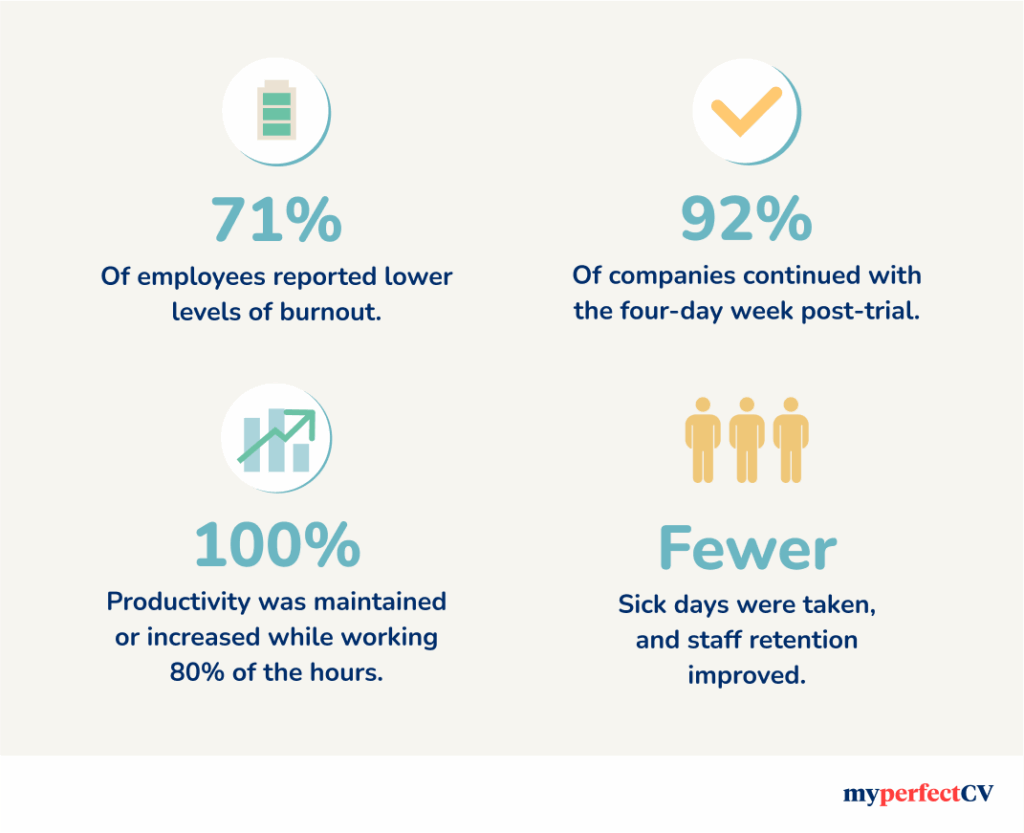
The success of these trials shows that it is possible to reduce working hours without harming business performance, leading to considerable gains in employee well-being.
Conclusion
Overwork in the UK is a severe and systemic crisis hidden beneath the surface of national statistics. It is a crisis of unpaid labour and unsustainable pressure, felt most acutely by the people delivering the most vital public services. For them, a sense of professional duty is being stretched to its breaking point by systemic underfunding and staff shortages, leading to burnout, moral injury, and a mass exodus from their professions.
The cost to the UK is immense—billions in lost economic output and a public health crisis of work-related stress. The solution requires more than just telling people to manage their time better. It demands systemic reform.
- Invest in public services: Addressing the workload in education and healthcare requires a real commitment to funding, long-term workforce planning to fix staff shortages, and a rethink of the accountability systems that create so much administrative bloat.
- Challenge the “always-on” culture: The culture of unpaid overtime must be tackled through stronger regulations and new policies that re-establish a boundary between work and life.
- Embrace smarter work, not longer hours: The success of the four-day week trials proves that there is a better way. Businesses and policymakers must challenge the outdated idea that long hours equal high productivity.
Ultimately, tackling overwork is not just about employee perks; it is an economic and social necessity. The health of the UK’s workforce, the sustainability of its public services, and the productivity of its economy depend on creating a world of work that is not just profitable, but humane.
Methodology
The findings in this article on Britain’s burnout crisis are drawn from a multi-source review of labour market data, workforce research, and policy analysis. Our approach included:
- Labour market statistics: We used Trades Union Congress (TUC) analysis on unpaid overtime to quantify the scale of overwork in the UK.
- Teaching profession insights: Evidence from the Department for Education’s Teacher Wellbeing Report and the Institute for Employment Studies was reviewed to understand workload pressures, retention challenges, and the impact on educators.
- Healthcare perspectives: Sources such as Motics.ai provided insight into the drivers of clinician burnout, while NHS staffing shortages and stress-related evidence were considered through parliamentary written evidence submissions.
- Workplace stress and public health data: Reports from First Mats and the Health and Safety Executive informed our analysis of work-related stress, depression, and anxiety across different industries.
- Job quality and labour economics: The Resolution Foundation’s Labour Market Perspectives report was referenced to assess long-term shifts in work intensity and job satisfaction.
- Future of work and policy developments: Committee evidence and myPerfectCV’s own reporting on the four-day week informed our assessment of potential solutions to Britain’s overwork problem.
- Editorial validation: The myPerfectCV editorial team reviewed and fact-checked all data to ensure accuracy, consistency, and alignment with the realities of the UK labour market.
This methodology ensures the conclusions presented reflect both the statistical evidence of overwork and the lived experiences of UK workers, highlighting the systemic challenges and opportunities for reform.
Sources
- https://www.tuc.org.uk/news/uk-workers-put-26-billion-worth-unpaid-overtime-during-last-year-tuc-analysis
- https://www.tuc.org.uk/news/uk-workers-put-26-billion-worth-unpaid-overtime-during-last-year-tuc-analysis
- https://assets.publishing.service.gov.uk/media/5fb41122e90e07208d0d5df1/Teacher_well-being_report_110719F.pdf
- https://www.employment-studies.co.uk/news/why-recruitment-and-retainment-teachers-so-challenging
- https://www.nhsemployers.org/articles/beating-burnout-nhs
- https://www.firstmats.co.uk/blogs/facts-and-statistics/executive-summary-of-workplace-stress-anxiety-depression-statistics-2023
- https://economy2030.resolutionfoundation.org/wp-content/uploads/2023/04/LPB-2023.pdf
- https://committees.parliament.uk/writtenevidence/141239/pdf/
- https://www.myperfectcv.co.uk/blog/four-day-workweek

Andrew Smith
Senior Content Writer
Meet Andrew Smith – an accomplished English copywriter with a strong background in SEO optimisation. Passionate about producing engaging content, Andrew has written across various fields, including health and fitness, security, travel, and tourism.
*The names and logos of the companies referred to above are all trademarks of their respective holders. Unless specifically stated otherwise, such references are not intended to imply any affiliation or association with myperfectCV.










